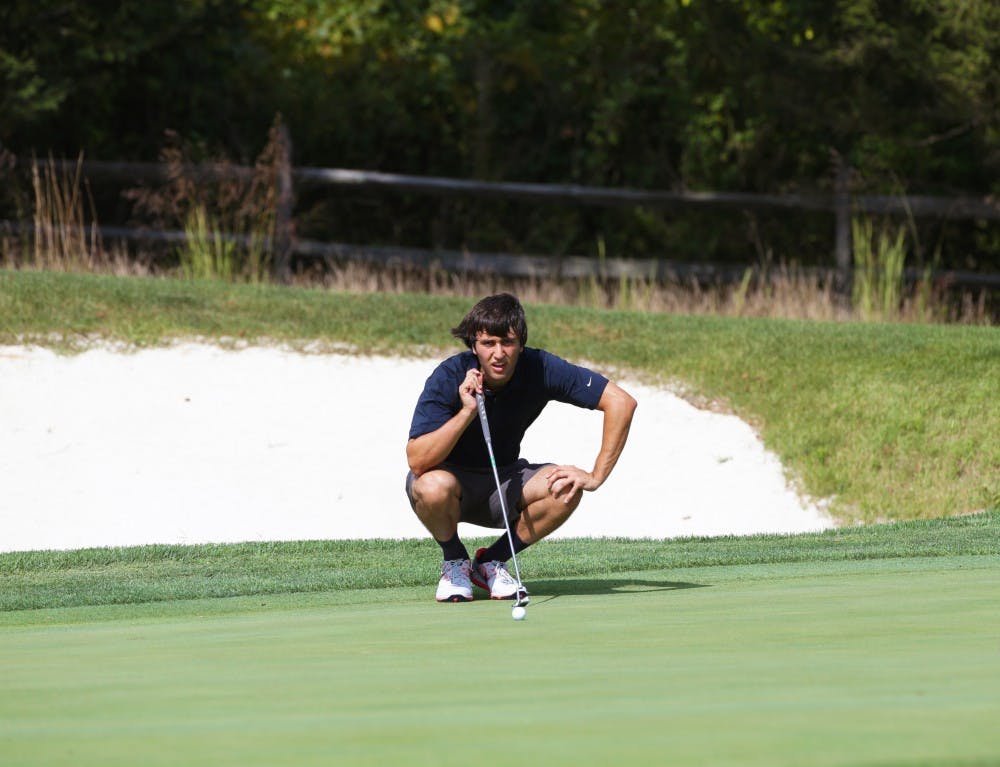April 23rd, 2017 was a great day for Zareh Kaloustian: as a sophomore, he led the way for Penn men's golf at the Ivy League Championship, and his six-over final score earned him second-team All-Ivy honors.
But, beyond his remarkable performance, there was something that made this day truly special for Kaloustian: he was cut from the team only months prior.
Kaloustian’s freshman year on the golf team was challenging. In nine tournament rounds, he posted an average score of 80.7, and his best individual finish in a tournament was a tie for 61st in the Quechee Club Invitational.
As a result, before the fall 2016 season, then-coach Bob Heintz met with Kaloustian, and delivered the bad news.
“Essentially, coach pulled me aside and told me that he could only take nine players for the year,” the Los Angeles native recalled. “And, unfortunately … I would not be one of those nine players.”
Being cut from the team hit Kaloustian hard, particularly given he was recruited as a golfer.
“I had always sort of taken golf as a given. I came to Penn to play golf, so it was a harsh realization finding out that would no longer be possible — at least for the year,” he said.
Heintz’s decision was also hard on the team.
RELATED:
Stocked with returning stars, Penn men's golf is ready to get back to the top
Penn golf programs stuck in middle of the pack at Ivy League Championships
Penn men's golf surges to second-place finish in shortened invitational
“It was definitely tough,” said Kaloustian’s classmate Josh Goldenberg. “I think that it was a very unfortunate event for that to have happened.”
With a significant portion of his college life fundamentally changed in the course of one interaction, Zareh used the following days to reflect on the role of golf in his life, and what he wanted to do with the sport going forward.
In this period of reflection, he found a new perspective on golf. And with this new perspective, he found his game again.
“I came to know that I love golf, and I wanted to continue it regardless of whether I was on the team or not,” he said. “And so, it made it easier to focus on the process of improving my game, and less on just getting the ball in the hole so that I could qualify for the next week.”
Kaloustian assumed that, if he wanted to get back on the team, it would not be until the fall of 2017. However, with the departure of Bob Heintz and a fresh set of eyes in interim coach Michael Blodgett, his rapidly improving game was noticed, and he was offered a spot on the team again.
“Getting back on the team was incredible for me because I had set that goal immediately once I had gotten cut to get back on the team and to play in Ivies the next year," he said. "Fortunately… I had that be a possibility for me in the same year."
He made the most of this opportunity.
Kaloustian returned to tournament action at the Princeton Invitational. In the first round, he shot a 8-over 79, but he then proceeded to put up a pair of superb 73s, which was good for a tie for second best among the Quakers who were competing. He put forth a similarly strong effort at the Yale Invitational, carding a 72 and 76 in the two rounds of the tournament.
Then came the Ivy League Championships, where Zareh carded two 75s and a 72 for a combined score of 222 strokes, the lowest overall score for the Quakers and good for a top-ten overall finish.
While the second-team All-Ivy honor was satisfying in and of itself, what it represented to Kaloustian was much more meaningful.
“It wasn’t so much that finishing All-Ivy itself was the breakthrough moment — it was more of a confirmation of everything I had been doing," he said. "Personally, it was a confirmation that I was treating golf the right way again.”
His 74.4 stroke average on the season was the lowest on the team, but Kaloustian’s impact on the team stretched far beyond just his skill on the course.
“He’s just great,” remarked Goldenberg. “To have someone like him around, as a person and as a friend, is beneficial for everyone. And then, on top of that, to have him be the golfer that he is, is a bonus almost.”
Kaloustian has continued playing at a high level this season. Earlier this month, he shot a 70 in the first round of the Princeton Invitational — the lowest score of his collegiate career — and led the field in overall birdies, carding 12 in the two-round tournament.
Being cut was a rude awakening, but ultimately, it played a critical role in helping him get his game to where it is today.
“The lasting impact of [being cut] is that I focus more on improving each and every day when I get on the course, and I make sure that I have fun when I play,” he said. “Those are thing that I take to the course today, and are the things that make me play better.”



